Physical Address
304 North Cardinal St.
Dorchester Center, MA 02124
Physical Address
304 North Cardinal St.
Dorchester Center, MA 02124
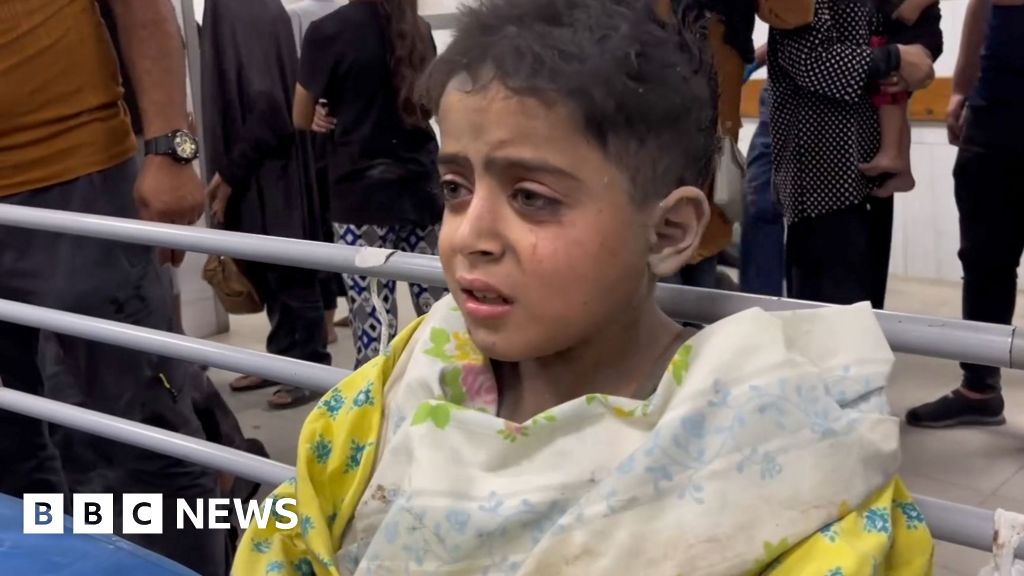
With the beginning of the war, work became his life. Many of the people who were bombed were his neighbors, people he grew up with.
Hatem Al-Attar, 25, was not married. His courage was not reckless or born of ignorance. He knew he could die at any second.
“All the days of the war from October 7 so far it’s been hard. Every second in this war was difficult. You can lose your life, your loved one at any second,” says Hatem.
He is sitting in the Civil Defense office in Deir el-Balah with his comrades. They talk and check their phones. Everyone survived.
Ninety-four of their comrades died. More than 300 were wounded – nearly half of Gaza’s civil defense organization.
For Hatem, death was as close as the explosion that knocked him off his feet in a house near Nasser Hospital.
“There were wounded and killed around the house,” he recalls.
“I went in to check if anyone was alive or dead. Once he entered, a reconnaissance missile hit the house.”
Footage taken by a colleague shows him entering the building. A fire is burning to the left of the frame.
Then there is a loud explosion, billows of smoke, and a man staggers out, but it is not Hatem.
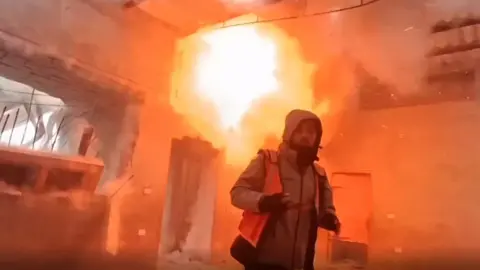
His friends go back inside and pull him out. He coughs and needs to be supported. But he survives.
Others close to him were not so lucky.
On March 14 last year – at the beginning of Ramadan – one of his brothers called him at four in the morning.
No one in Gaza, during the war, called at that time with good news.
“He told me that our house in al-Burayj was damaged and my father was killed.”
Hatem went to Al-Aqsa Martyrs Hospital in Deir el-Balah and met a family friend who directed him to the morgue.
“When I went there, my father was lying on the floor next to eight other bodies. It was my daughter-in-law and her seven children! I was shocked.”
Nevertheless, Hatem continued to walk, at the site of explosions, collapsed buildings, rubble, where the dead and sometimes the living were buried. He pulled out bodies and body parts.
The hour came when the bombing and shooting stopped.
The first night without airstrikes. It’s time to start thinking about what was not guaranteed in the last 15 months – about the future.
His thoughts turn to education and romance.
“In connection with the agreement, I should think about what to do next. I will study at the university as soon as the universities reopen. I am single, but I will think about marriage.’
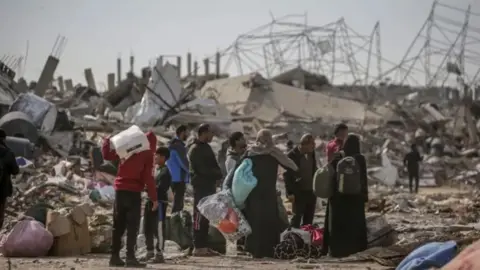 EPA
EPATo try and tell the story of how the people of Gaza survived this war, my colleagues and I at the BBC depended on the tireless efforts of local journalists working on our behalf.
Israel banned foreign media from entering Gaza independently report on the war.
Local BBC journalists have been on the streets almost non-stop over the past 24 hours to capture the mood in Gaza during the ceasefire: a gunman standing on a road in Nuseirat, central Gaza, firing into the air; Hamas fighters and police reappear; a few yards down the road another group of men shooting into the sky; crowds gather at street intersections and street corners; a man is kneeling and kissing the ground.
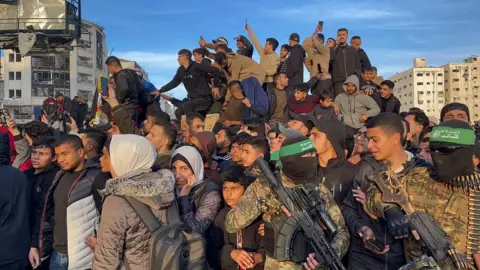
But all this is happening against the background of devastation. Trucks and cars, burdened with people’s belongings, pass by. Some use donkey carts to carry possessions that remain after they have moved many times.
There are hundreds of thousands of trips in Gaza today. Some of them are actually being implemented. Others exist in the imagination. Everyone has one direction – home.
Professor Jumaa Abu Shikha arrives at the remains of his house in Nuseirat.
First, he says the feeling of survival is “indescribable.” He prays to himself: “God is the best manager of our affairs.”
He repeats this as he moves from one ruined room to another. His wife and several children are coming.
The walls are blown away. The interiors are covered with marks from machine guns and shrapnel.
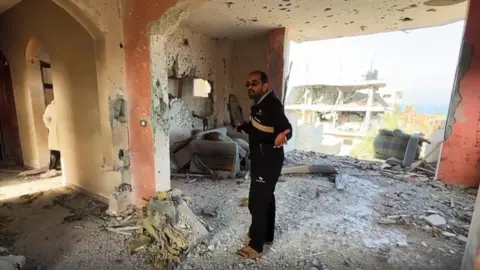
Professor Abu Shikha describes how he built the house “block by block”, painted it and cherished the moment he brought his family here.
“I can’t find a house, I only see destruction, not a house,” he says. “I wasn’t expecting this. I was expecting to come home and find a place to shelter myself and my children.”
He points to his daughters’ room and his sons’ room, so carefully decorated and now empty. “The feeling is indescribable,” he says.
A huge reconstruction task lies ahead. UN and aid organizations repeatedly accused Israel of obstructing the flow of aid; The United States at one point threatened to cut military aid to Israel if more aid was not allowed in Gaza. Israel denies aid cuts.
Trucks crossed the lane with help all afternoon. Among them was a cortege of the Jordanian Hashemite Charitable Organization, which we reported last weekon the way from Amman towards Gaza.
Trucks have transported tons of medicine and food to help the nearly two million displaced people in Gaza – roughly 90% of the population.
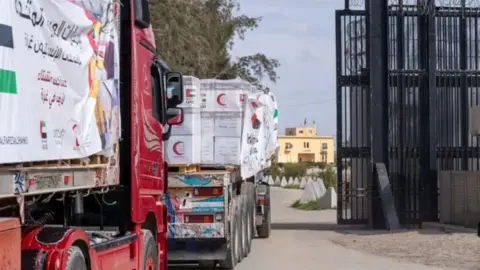 Getty Images
Getty ImagesThis kind of help is tangible help. It can be weighed, counted, loaded and ultimately distributed. People can be fed and given medicine. But there is another task whose demands are enormous and which will have a profound effect on the future of Gaza.
The war created an unknown number of traumatized adults and children. We recorded several of their stories but know about tens of thousands of others that remain unspoken.
The children faced severe suffering. According to the survey of caregivers of 504 children, for Art British charity “War Child”.96% of children felt that death was inevitable.
Surveys also found that 49% had a wish to die. Our journalists often heard young survivors say that they would like to join their dead mother, father or brother.
Ten-year-old Amr al-Hindi was the only survivor of an Israeli strike on the building where he lived in Beit Lahia last October. Our colleague from the region filmed Amr in the hospital immediately after the attack.
The floor around him was littered with wounded. The woman was sitting up, bleeding from her ear. A man has just died nearby.
– Where is the Sheriff? Amr asked repeatedly. The nurse told him the Sheriff was fine. “I’ll take you upstairs to see him.” But Sheriff, his brother, did not survive. Neither did his other brother, Ali, or his sister Aseel, or his mother and father. The whole family disappeared.
Right after the ceasefire was announced, we went back to see what happened to Amr al-Hindi. He lived with his grandparents, and it was obvious that they loved him with care and tenderness. After the bombing, the child had three toes amputated, but he walked normally.
Amr sat on his grandfather’s lap and looked directly into the camera. He was still and calm, as if he was watching from behind a thick protective screen. He started talking about his brother Ali and how he wanted to go to Jordan and study to be a doctor.
“I want to become like Ali. I want to fulfill his dream and go to Jordan to become a doctor,” he said. But within the last few words the tears started and he sobbed.
Amr’s grandfather kissed him on the cheek; he said “cute” and patted his chest.
At this moment it is clear that there are many wars.
Some of them paused. Others, for the survivors, will live long into the future.
With additional reporting by Alice Doyard, Malaak Hassona and Adam Campbell.